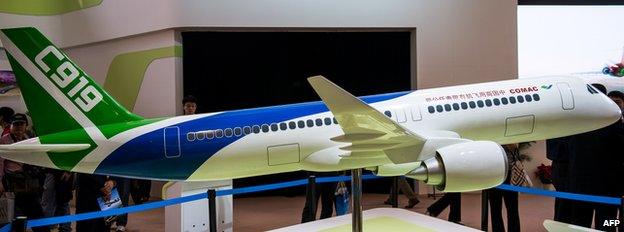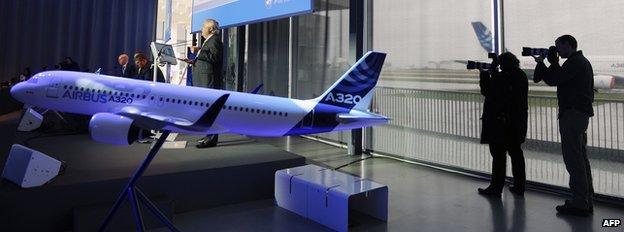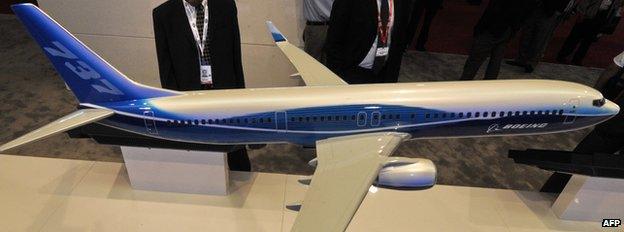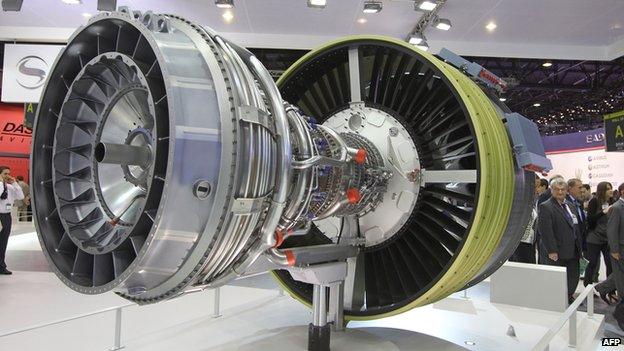Singapore Airshow: Can China dominate aircraft manufacturing?
- Published

China is looking to target the fast-growing market of single-aisle aeroplanes with the C919
The Chinese have a saying: "Nothing is impossible to a willing mind."
They have proven it over the years, especially on the world business stage, with Chinese companies becoming dominant global players in various sectors.
Now, they are facing their toughest test.
China has set its sights on commercial aeroplane manufacturing - a sector that has arguably more hurdles and stumbling blocks than any other.
"The barriers to entry in commercial aircraft manufacturing are extremely high, and they are not just technological," says Richard Bitzinger, a senior fellow at S Rajaratnam School of International Studies.
Tough competition
The state-owned Commercial Aircraft Corporation of China (Comac) is the one tasked with helping Beijing break into the sector.
Set up in 2008, the firm is betting on its C919 aeroplane - a narrow-body, or single aisle plane, external that can seat up to 168 passengers - to be its launch pad.
The company is targeting the segment as the market for 100 to 200-seat single-aisle planes is forecast to be worth $20 trillion (£12.8tn) over the next 20 years.
A large part of that growth is expected to come from Asia, and Comac is looking to attract customers with its presence at this week's Singapore Airshow, external.
However, it is up against stiff competition. The sector is dominated by Airbus's A320, external and Boeing's 737, external, which have received more than 10,000 orders each.

The A320 can seat 150 passengers in a typical arrangement and up to 180 with high-density seating

The 737 is Boeing's best-selling plane, with more than 7,500 jets already delivered
"Comac is up against one of the world's strongest duopolies," says Mr Bitzinger. "Airbus and Boeing produce nearly every 100-seat-and-above passenger jet flown by nearly every airline in the world."
Other firms are also eyeing the sector. Bombardier's much-anticipated C-Series aircraft is seen by many as the most serious potential rival to Airbus and Boeing in the segment.
As that plane gets ready to enter commercial service, it is likely to become even tougher for Comac to break in.
Quality control
Perhaps an even bigger hurdle is winning the trust of customers that it can build a reliable and safe plane, not least because hundreds of lives are at stake every time a plane is airborne.
Planes are highly complex machines. Thousands of parts need to be fitted and integrated together for them to function properly and any faults can create serious problems.
This is where, analysts say, China's reputation over safety issues may prove to be a stumbling block.
"There is a perception that China doesn't have strict quality control," says Shukor Yusof, an aviation analyst with Standard & Poor's.
"Whether that is justified in this case, we don't know. But when it comes to aeroplane manufacturing, perception is everything."
Shivaji Das, an aviation analyst with consulting firm Frost & Sullivan, adds that previous quality control scandals in other sectors such as baby formula have contributed to such concerns.
Beta tester?
Many of the key components for the plane, including its engine, are being supplied by foreign firms.
Its suppliers include GE, Honeywell Aerospace and Rockwell Collins. Comac has also agreed a technical collaboration with Bombardier.
That should help allay some concerns over quality control.

The engine for the C919 will be provided by CFM International - a joint venture between Snecma and GE
However, analysts say that eventually the parts are being put together at local facilities and Comac's inexperience in doing so may worry some customers.
The fact that Comac has delayed the first test flight of the plane has not helped.
"No-one wants to be a beta tester of a new aircraft, especially from a manufacturer with little or no prior experience," says Mr Bitzinger.
"There are many things that can go wrong with a new plane and as an airline you need to feel assured the manufacturer has the resources and capability to sort it out quickly."
Even Boeing and Airbus - with decades of experience - have faced problems with new models.
Boeing's 787 Dreamliner has had problems with battery fires, while Airbus's A380 saw hairline cracks appear on some of the brackets used to link the wing to the plane.
Domestic boost
The one thing going in favour of Comac is that it does not need to rely on global orders, at least not yet.
China is one of the world's fastest growing aviation markets and is likely to see big demand for single-aisle planes over the next two decades.
Comac has already got 400 orders for the C919 - mostly from China - and the number is expected to rise further.
"They are likely to get some sort of a protected access to the domestic market," says Mr Das, of Frost & Sullivan.
He adds that starting out in the domestic market is likely to benefit Comac.
"It's their home turf, so safety and quality concerns are likely to be less of an issue," he says.
"And if the plane performs well over time, with no major problems, you can't rule them out from having a serious shot on the global stage," he adds.
International Airlines Group (IAG), the parent company of British Airways and Iberia, is already talking to Comac about future aeroplane needs.
A turbulence-free take-off in China may well ensure a smooth landing in those markets.